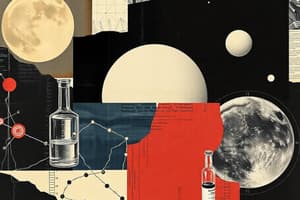Podcast
Questions and Answers
What was the primary belief of the geocentric model?
What was the primary belief of the geocentric model?
- The Earth is at the center of the universe, and all other celestial bodies orbit around it. (correct)
- The universe has no definitive center, and all celestial bodies orbit in random patterns.
- The Sun is at the center of the universe, and all other celestial bodies orbit around it.
- The Moon is at the center of the universe, and all other celestial bodies orbit around it.
What did Nicolaus Copernicus propose that contradicted the geocentric model?
What did Nicolaus Copernicus propose that contradicted the geocentric model?
- That the Moon orbits the Earth, while the Earth orbits the Sun.
- That the universe has no definitive center, and all celestial bodies orbit in random, elliptical patterns.
- That the Earth is flat, and all celestial bodies orbit around it in a circular pattern.
- That the Sun is at the center of the universe, with the planets orbiting around it. (correct)
Which of the following scientists was sentenced to death?
Which of the following scientists was sentenced to death?
- Nicolaus Copernicus
- Charles Darwin
- Antoine-Laurent de Lavoisier (correct)
- Galileo Galilei
What was the main idea behind Charles Darwin's theory of evolution?
What was the main idea behind Charles Darwin's theory of evolution?
Which of the following was not mentioned as an influencer of the Scientific Revolution?
Which of the following was not mentioned as an influencer of the Scientific Revolution?
What was the period of paradigm shifts and changes in scientific beliefs and social institutions called?
What was the period of paradigm shifts and changes in scientific beliefs and social institutions called?
Who was the scientist that asserted a heliocentric (sun-centered) cosmos?
Who was the scientist that asserted a heliocentric (sun-centered) cosmos?
What characterized the scientific revolution?
What characterized the scientific revolution?
Who proposed universal laws and a Mechanical Universe, marking the end of the scientific revolution?
Who proposed universal laws and a Mechanical Universe, marking the end of the scientific revolution?
In which century did the scientific revolution primarily take place?
In which century did the scientific revolution primarily take place?
Study Notes
Geocentric Model
- The geocentric model posits that the Earth is at the center of the universe, with all celestial bodies, including the sun and stars, revolving around it.
Nicolaus Copernicus
- Copernicus proposed the heliocentric model, which asserts that the sun is at the center of the universe and planets, including Earth, revolve around it.
Sentenced Scientist
- Giordano Bruno was a scientist who was sentenced to death for his heretical views, which included support for the heliocentric model.
Charles Darwin's Theory of Evolution
- Darwin's theory of evolution centers on natural selection, arguing that species evolve over time through the survival and reproduction of individuals with advantageous traits.
Influencers of the Scientific Revolution
- While various figures influenced the Scientific Revolution, individuals such as Galileo Galilei and Isaac Newton are noted, while others may not have been explicitly mentioned.
Period of Paradigm Shifts
- The period characterized by significant shifts in scientific beliefs and social structures is known as the Scientific Revolution.
Heliocentric Cosmos
- Nicolaus Copernicus is credited with asserting the heliocentric model, fundamentally altering the understanding of the cosmos.
Characteristics of the Scientific Revolution
- The Scientific Revolution is marked by advancements in scientific thought and methodology, a questioning of traditional beliefs, and the emergence of empirical evidence.
Universal Laws and Mechanical Universe
- Isaac Newton proposed universal laws of motion and gravity, bringing the Scientific Revolution to a conclusion with the concept of a Mechanical Universe.
Century of the Scientific Revolution
- The Scientific Revolution primarily took place during the 16th and 17th centuries, heralding substantial changes in scientific thought.
Studying That Suits You
Use AI to generate personalized quizzes and flashcards to suit your learning preferences.
Description
Test your knowledge on intellectual revolution and definitions related to science. Questions cover topics like science as an idea, science as an intellectual activity, and the scientific revolution.




